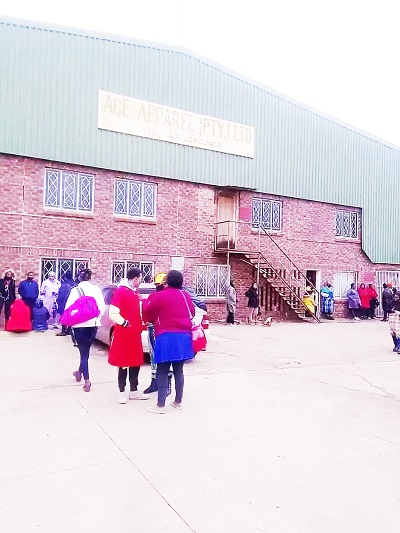By: Thoboloko Ntšonyane
MASERU- Minister of Trade and Industry, Business Development Hon Mokethi Shelile and the acting Chief Executive Officer (CEO) of the Lesotho National Development Corporation (LNDC) Advocate Molise Ramaili have announced that a new investor who will take over the operations of Ace Apparel International has been identified.
Last week this publication reported that Ace Apparel International has been closed and its workers are stranded following the ‘disappearance’ of its owners.
Although they declined to reveal the identity of the investor, they said it is a local investor and is expected to take over the operations of Maputsoe based Ace Apparel International once necessary arrangements have been finalised.
According to the Minister and LNDC acting CEO, the investor will also take over the factory along with its workers and is prepared to pay them their dues.
These developments will bring hope to the workers who were unsure about their future following the stunt pulled by the previous employers.
The reports we received last week were that, the workers found the door locks changed and unable to access the premises.
This happened on Monday that week forcing workers to be outside employment since then.
Ace Apparel International produces garments and exports them outside the country.
The owners of this factory are reportedly hiding in the Netherlands.
Shelile said the long arm of the law will ultimately catch them. He said despite the drawn out extradition processes, these owners who had abandoned their workers will still have to come back to the country to account for their actions.
Having worked in LNDC for about 17 years, he said this is about the fifth time an investor ‘runs away’ and leaves their employees stranded.
Advocate Ramaili said the owners do not owe them rent, he further said they did not owe water and electricity. Sometimes owners close shops when they are on the brink of liquidity.
The acting LNDC CEO said they have secured their building and have taken an inventory of the equipment in that factory. He said there are still sewing machines and other equipment including the cloth that is valued at M3 million.
Pulane Lekhanya, a worker in this factory said they have been paid their November salaries and were due for December including the leave pay.
In an interview with this publication following his swearing into Labour and Employment portfolio, Hon Tšeliso Mokhosi said one of the ideas he will share with the workers and unions is that there should be a workers’ scheme where workers will be contributing during their service so that such funds take care of them when they are outside of employment.
The National Clothing Textile and Allied Workers Union (NACTWU) deputy Secretary-General Tšepang Makokole also reiterated that it is not a novel incident for an owner of the factory to disappear on their employees.
Being active participants in the country’s economy, especially Leribe district, the closure of this factory which its future remains under discussions, has a bearing on the economy of that district as businesses such as transport, property rentals and vendors selling around factory areas are also going to suffer the consequences of this action.
Lesotho witnessed a rise in the establishment of textiles, and footwear manufacturing industry following the introduction of the United States Africa Growth Opportunity Act (AGOA) in the 2000s.
According to the World Bank, “textile and apparel sector is also a key employer of women, accounting for 80% of textile workers in Lesotho.
The textile industry is one of the largest employers in Lesotho employing thousands of Basotho.


